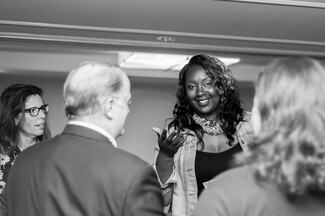
By Melissa Collins
“It’s not how many times you get knocked down that counts, it’s how many times you get back up.” (George A. Custer)
If my life could be summed up in one statement, that would be it. I’ve been knocked down plenty, but I always get up.
As a nationally and internationally acclaimed teacher and teacher leader, one would assume that I am just one of the “naturals,” born to lead the charge for my peers and model excellence in my craft.
Don’t be fooled. To become the educator I am now, I endured many failures and overcame numerous obstacles over two-plus decades. Looking back, I see my willingness to accept and embrace adversity as central to my development as a determined, powerful, worldly and malleable educator.
My journey into teacher leadership started in Hattiesburg, Miss., where I applied to the University of Southern Mississippi to study administration. My application was summarily denied. Twice. On the second denial, I asked Dr. Peters at the university what I would need to do to gain acceptance into their Master’s program. Dr. Peters shared something I will never forget. “Melissa,” he said, “I am looking at your Vitae, and you are not engaged in any leadership activities outside your classroom walls.”
Dr. Peters was right. If I really wanted to be a leader, why had I chosen to stay safely within my classroom? Why wasn’t I taking on new roles on behalf of my students, school, or community? How could I expect to be a leader without leading anything?

I put the Master’s program on hold and began to work on National Board Certification. I’d read the standards and I knew that the process of attaining National Board Certification would force me into informal and formal leadership roles. Colleagues told me that earning the Certification would also add value to my classroom instruction.
Still, I did not accomplish the National Board Certification the first time, missing it by only several points. During my second attempt, I brought up my game. I called science institutes and read websites to understand how to get my students engaged in science integrated with math. I also continued to push my leadership skills, becoming more intentional about my own learning, leading and collaborating. I learned that to lead from the classroom I needed to involve all stakeholders to support student achievement. This time I did accomplish the National Board Certification in Early Childhood Education.
When I applied again to graduate school at the University of Southern Mississippi, I was praised for successfully completing the National Board Certification process and my increased leadership capacity, but the admissions staff wanted me to retake my GRE, specifically improving my skills in mathematics. I agreed to take on this challenge, knowing that I needed support. After school, I worked with Mr. Carl Otis, our school’s 8th grade algebra teacher. When my scores on the retest improved by several points, I immediately called the University of Southern Mississippi, and I received an informal confirmation by phone that I would be selected for the Master’s program. It was my third try.
The following summer I left my son with my family. I traveled five hours to Hattiesburg, Miss., every weekend to pursue my degree. There were only two African-American women in the class of about 25. I was afraid that I would not fit in with my colleagues due to our diverse backgrounds. I also thought it would be difficult to manage the workload as a single mom and a fulltime teacher. But I faced my fears and I gave my best effort. I earned my Master’s one year later in 2007. Buoyed by this experience, I pursued additional degrees and I received my Specialist Degree in 2008 and my PhD in 2010. These degrees offered me greater lessons in perseverance and diligence, while continuing to open my eyes to the world of teacher leadership.

Even now, when I think about my journey to leadership my eyes tear up because it was not an easy road. I had to face my fears, take rejection, and push myself to do and learn more. I learned to go for my dreams, accept failure and refuse to accept “No.”
Ironically, as I persevered, I decided to stay in the classroom instead of leaving to become an administrator. I have learned that my students are my fuel, and I am their fire. I lead my students and my colleagues by example. Instead of telling them to persevere, I show them how.
Dr. Melissa Collins is a 2014 Finalist for Tennessee Teacher of the Year, a member of the National Network of State Teachers of the Year, a National Board Certified Teacher, Hope Street Group Tennessee Teacher Fellow, and a Top 50 Finalist for the 2018 Global Teacher Prize. She teaches Second Grade at John P. Freeman in Memphis, Tennessee.
Photo courtesy of NNSTOY
